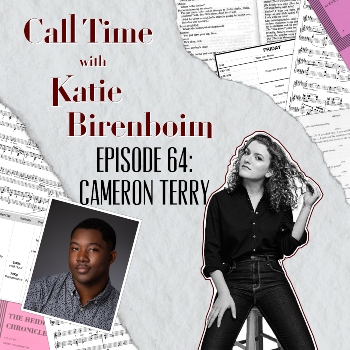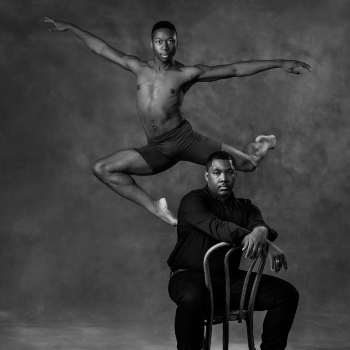
For my last podcast episode for a bit (don’t worry — it will be back soon enough!), I decided to focus on another one of my classmates in my NYU graduate program. Cameron Terry has many of the markers of a typical NYU student: he was super successful in his undergraduate institution — University of Oklahoma — and he was a performer in his own right. But while most of us have aspirations to work for an iconic theatre, dance, opera, or music organization, Cameron actually did the damn thing, and started his own dance company, Shades Dance Theater. While I knew this would be really interesting from an artistic perspective (what kind of dance does he focus on? Has he developed his own style? What’s the meaning of the name?), I also thought it would be enlightening for my business and entrepreneurial-minded readers (I didn’t take accounting for nothing!).
Speaking of my time with NYU Stern, it sometimes seemed as if every Stern class I took encouraged students to become founders and start their own businesses. I suspect that is consistent with most business schools these days, though as something of a risk-averse person myself, I’m not sure how sound that advice is, especially in the arts. Nevertheless we learn the nuts and bolts of the process: in our cases, what a 501c3 is, how and when you file, how and when you put together a Board, and, then, how you structure the organization, fundraise, and read and interpret financial documents (there’s that accounting class again). Something that I feel isn’t taught in schools — and maybe can’t really be taught — is the self-determination, vision, self-assurance, or whatever you want to call it that gives someone the ability to say “I want to do this — I want to start my own company,” especially at a young age.
In my discussion with Cameron, I noticed those qualities almost immediately as we began speaking about his life. “When you talk about transferring schools” (Cameron transferred from the University of Texas at Austin to Oklahoma because he felt that, while he “loved” UT, creatively, the dance department was not what he wanted or needed), I told Cameron in our interview, “you speak with a self-knowledge that not everyone has at such a young age.” “Where do you think that comes from?” I ask.
In the very eloquent discussion that follows (to which you should listen), Cameron talks about how losing his mother at a young age to breast cancer (he was in eighth grade) and the “grieving process” gave him a sort of “clarity” about his life, his ambitions, and what he wanted to do. “As I grew up…after the challenges I faced,” Cameron said, “and I’m putting myself through school, you get very clear about where you want to invest your time and your energy.” In the moment, Cameron connects that to the realization he had junior year of college that he wouldn’t continue dancing post-undergrad; he wanted to run his own rehearsals and be solely a choreographer. But I also connect that to his vision for Shades Dance Theater, and the fact that he’s one of the few young, arts entrepreneurs/founders I know.
Indeed, as discussed above, founding, and running, a company comes with a lot of “stuff,” to put it mildly. Cameron himself talks about all of the things that go into successfully managing a young, small company — he mentions in particular Board management and executive leadership as two of the most challenging day-to-day activities — so much so that he cautions young listeners against doing it themselves unless they feel certain they have the “vision” — the “abracadabra,” as he calls it.

But that’s the amazing thing about Cameron. So many young people — especially in college and even grad school — can’t even name what they feel, or what they know to be true about themselves. It speaks, once again, to that special degree of self-knowledge Cameron has (forged in times of strife, unfortunately), the ability to say “yes — this is what I want and I can speak it out loud,” or even to say “this is not what I want and I can’t do this right now,” something with which Cameron, myself, and I imagine many of my readers and listeners, have struggled.
In addition to this sense of clarity and purpose, Cameron speaks about maintaining one’s “peace” as a founder, leader, and artist. “You need to keep your peace because your peace and your attitude will dictate how you deal with your board, deal with your dancers, deal with your donors,” he assures me on the podcast, very wisely, when I ask about advice for listeners. It’s a truism about life I’ve found — if you’re unhappy and frazzled in your life, even if you feel like it’s because you’re working so hard, that feeling will start to impact your job, because it seeps into every interaction you have. And, as Cameron reminds us, too, on the podcast, the leader of an organization — especially a young arts organization like his — has to interact with almost every possible stakeholder. “As a director,” Cameron explains, “I’m not just worrying about [the dancers and their] choreography. I have to worry about the lighting plot. I have to worry if the marley will be down. How is everything plugged in? Do we need more gobos or are the gobos coming in? Do we have moving lights? How does the curtain fly out? Are we shipping the costumes? How does it fit? What is this fabric? Is it too expensive? Is it too cheap?” As his “director’s inner monologue” demonstrates (as a director myself, I can speak to the validity of this stream of consciousness), if you don’t have “peace” — with yourself, with the art, and with the process, none of the interactions he listed will be pleasant, positive, or all that effective.

While Cameron separates the two ideas, I believe that the sense of “peace” he describes goes hand in hand with self-knowledge and clarity of purpose. Cameron uses the ability to delegate as an example of “peace,” but I believe that being able to say “no — I can’t do that right now; can we find someone else to do so?” is much the same skill as being able to say “this is what I want to do — and let me tell you why.” As discussed above, both are crucial to being a founder and leader — in any business — but it’s something that I believe is found among artists in particular. In fact, I came to the realization recently that for all of the frustrations of this business — and there are certainly many: intense competition, uncertain or uneven schedules, strong personalities, and sometimes insultingly low pay — I have always been blessed to have known what I love to do. And, perhaps more amazingly, to have the self-knowledge, and in some sense, the courage, to name it out loud, and thus speak it into existence. This is, I believe, what sustains and motivates someone like Cameron to research non-profit management and file for 501c3 status from his “cute apartment in Norman Oklahoma” while eating Chipotle. It’s what makes him determined to sell out two upcoming shows in Atlanta (especially when he was told it couldn’t be done and was too “early” for the company). If I’ve learned anything in grad school, it’s that while having artistic vision, creativity, and talent certainly help, it’s that clarity, and purpose, that ultimately makes or breaks a founder.

But in the arts industry, the art certainly DOES help. Cameron and I go in depth about his choreographic style, influences, and creative process on the podcast, exploring the “triangle” that connects him and his company with Alvin Ailey and Lester Horton. We discuss how, in Cameron’s view, music is just as important as the “steps” themselves, and how his penchant for “oldies” like Marvin Gaye and Donna Summer set him apart. “People will be saying, ‘yeah, that’s a Cameron piece,'” he tells me. We talk about his attention to detail — specifically visuals — and how he’s taken everything we’ve learned in our various marketing classes to make the Shades Dance Theater website a cut above. Finally, we talk about lighter topics like Barney, getting your bio read aloud, tutus, and something I’ve deemed “office-core” (aka an artist’s strong desire to go into a midtown office sometimes and wear, like, khaki pants).
Listen to the whole episode, and, as always, let me know what you think! As discussed above, I am taking a little bit of time off from the podcast while I do a really exciting gig (!!) AND finish up my last semester of graduate school, but Call Time will be back soon as we continue to explore the business of theatre, and the next generation of arts leaders, together.


Leave a Reply